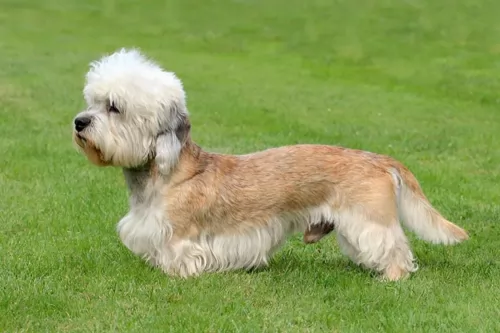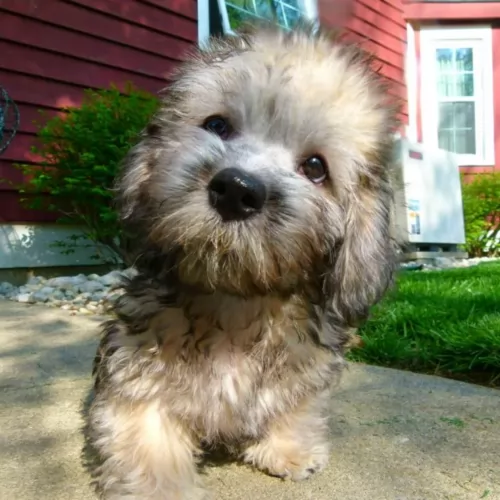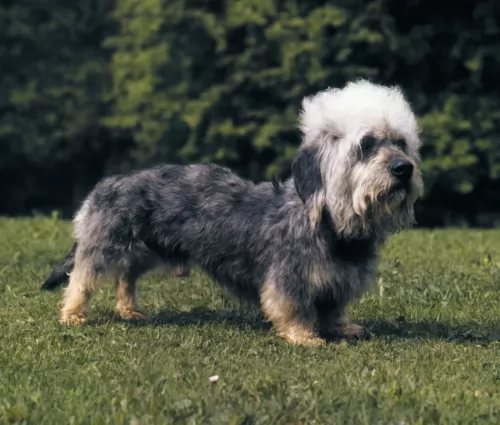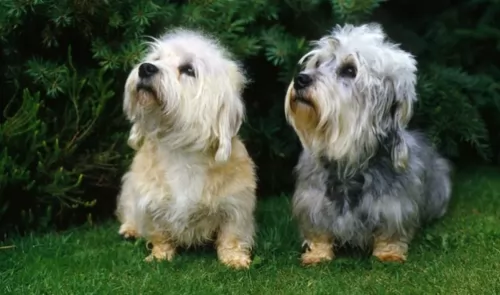 Petzlover
PetzloverCanadian Pointer is originated from United States but Dandie Dinmont Terrier is originated from United Kingdom. Canadian Pointer may grow 48 cm / 19 inches higher than Dandie Dinmont Terrier. Canadian Pointer may weigh 16 kg / 36 pounds more than Dandie Dinmont Terrier. Both Canadian Pointer and Dandie Dinmont Terrier has almost same life span. Both Canadian Pointer and Dandie Dinmont Terrier has almost same litter size. Canadian Pointer requires Low Maintenance. But Dandie Dinmont Terrier requires Moderate Maintenance
There are some dog breeds whose history and origins are dubious. The existence of the Canadian Pointer is also a matter of debate, and research reveals very scanty information.
The dog seems to have been a gundog which originated in the United States. Another name for the dog is Adirondak Pointing Dog. The Canadian Pointer was developed from English Pointers, Labrador Retrievers and Portuguese Pointers during the 19th century. He was used for hunting and retrieving prey such as birds and rabbits.
 The rough coated Dandie Dinmont Terrier originates from Scotland. They were used centuries ago for hunting otters and badgers.
The rough coated Dandie Dinmont Terrier originates from Scotland. They were used centuries ago for hunting otters and badgers.
There are theories that exist that the dog is a cross between Scottish- and Skye Terriers while others believe there must be some Dachshund in the mix because of the long body of the Dandie Dinmont Terrier.
The Dandie Dinmont Terrier was first recorded as a distinct breed in the late 1600s. The British Dandie Dinmont Terrier Club was formed in 1875 while the American Kennel Club recognized the Dandie in 1886.
The Canadian Pointer makes for an excellent family pet. He is intelligent, excitable, loving and devoted, forming a strong bond with his human family. Active and excitable, it is this very energetic characteristic which will require him needing training and socialization. He is inclined to want to jump up against his family at the sheer joy of seeing them.
Although he loves country life, his love of human companionship allows him to adapt to city life and he is non-aggressive and can be a placid pet with children and other pets in the home.
The Canadian Pointer is a medium- to large sized breed of gundog. He has a lean, well muscled body with a short, coarse coat. The coat can be dark brown and white, black and white or a fawn color and white. The coat can also be freckled in parts.
He is a gundog belonging to the HPR group. HPR stands for hunting, pointing and retrieving. Weighing roughly 22–27kg, he stands about 56 – 76cm in height. Sometimes the tail is docked but otherwise it is left so that it’s medium length and is held straight out and level with the body. The ears of the Canadian Pointer are fairly short and floppy.
 The Dandie Dinmont Terrier is a small dog who stands between 20 – 28cm at the withers and weighs between 8 and 11kg. He is recognizable by his fluffy head of hair.
The Dandie Dinmont Terrier is a small dog who stands between 20 – 28cm at the withers and weighs between 8 and 11kg. He is recognizable by his fluffy head of hair.
He actually has quite a unique look with his long body and slightly over-sized head. He has floppy ears and a long tail. His coat is quite unusual too in that it can be silky and long around the face, legs and belly, while the topcoat is fairly shortish and crisp. His coat color is fawn to brown or reddish. He isn’t a heavy shedder.
Known also as the Dandie, Charlie’s Hope Terrier, the Mustard and Pepper Terrier, the Dandie Dinmont makes an excellent family pet with his calm demeanor, being somewhat reserved around strangers.
He is an alert, intelligent little dog and will warn you of strangers coming into your space. He therefore makes a good watchdog. He is loving and loyal to his human family and will readily fit into life in the city or in the countryside.
They are good with children and pets but with his independent streak, he will require training and socialization if you want him to behave and be obedient.
The Canadian Pointer is a dog who thrives on hard work and they are strong-willed, confident and boisterous but never aggressive. They’re intelligent and alert and respond well to training and socialization. Once trained he works hard to please his owner.
The Canadian Pointer is independent and can be aloof around strangers, but he just loves his human family and makes every effort to please them and be around them whenever he can. Treat him properly and he will give you endless hours of enjoyment and companionship.
 Your Dandie Dinmont is capable of being a wonderful companion. He loves spending time with his human family and is affectionate and loyal.
Your Dandie Dinmont is capable of being a wonderful companion. He loves spending time with his human family and is affectionate and loyal.
The small Dandie is able to fit into life in the city or country, just so long as he has his human family with him. Because he comes from Terrier dogs, he is no push-over though and he has an independent streak which will benefit from training and socialization.
Make sure you give this small dog of yours plenty of love and good care and you will find that you have a loyal, devoted friend in him.
Pointer dogs are looked upon as a healthy breed, but having said that, they aren’t immune to illness, and there are some common dog diseases that you should be aware of -
This disease is caused by a malformation of the hip joint. This ailment can result in pain and discomfort for your pet as well as arthritis and even lameness. Unfortunately there is no cure but the vet can do a lot to make life more comfortable for your pet.
This is a genetic eye disease where your pet gradually loses vision. The retina deteriorates and stops functioning.
 Your pet Dandie Dinmont is a robust little dog who, with good care, can live to be anything between 12 to 15 years of age.
Your pet Dandie Dinmont is a robust little dog who, with good care, can live to be anything between 12 to 15 years of age.
With every dog breed there will be health concerns, and these can include illnesses such as epilepsy as well as hypochondroplasia. All dogs have the potential to fall prey to health problems, and getting your pet from a reputable breeder can help to ensure you eliminate some of these diseases.
This small dog has a long body which means he can be affected by spinal problems. Genetics and body shape play a large role. Intervertebral disc disease is a condition where the cushioning discs between the vertebrae of the spinal column herniate into the spinal cord space. The discs press on the nerves and pain and paralysis can follow.
The Canadian Pointer was specifically developed to be a hunter so he is an energetic dog. When it comes to caring for him, training and socialization can make him an even more amicable pet. He is muscled and lithe and you want to keep him that way by ensuring he is well exercised.
Take him on walks, into the park with ball and frisbee or let him run while you cycle. Don’t leave him without exercise as he can become frustrated and ill.
The Canadian Pointer is a low maintenance breed with his short coat. You’ll need to give his coat a good brushing twice a week to rid him of loose hairs to keep the hair shiny and healthy.
Dogs like the Canadian Pointer with floppy ears will need to have their ears checked for infections to avoid hearing loss. You’ll see your dog shake his head, the inside of his ears may be red and he could have a moist discharge.
Remember that yeast and bacteria are problems with floppy-eared dog breeds and you’ll need to ensure that the ears are cleaned and kept dry. Be careful if you don’t know how to do it, and get advice from your veterinarian on how to attend to the ears of your dog.
 The Dandie doesn’t require as much exercise as some other dog breeds but you want to make sure he goes with you on your walks, or you play ball with him in the garden. You don’t want to see a small dog like this becoming obese as it can herald in a host of health problems.
The Dandie doesn’t require as much exercise as some other dog breeds but you want to make sure he goes with you on your walks, or you play ball with him in the garden. You don’t want to see a small dog like this becoming obese as it can herald in a host of health problems.
The Dandie Dinmont Terrier doesn’t shed a hang of a lot but still, you will need to brush him twice a week to get rid of those loose hairs. Also, the coat will require stripping twice a year. Some dog owners who prefer a low maintenance breed might not like knowing this, but it is a necessary part of his grooming. There are some dog owners who cut the hair rather, but then the texture of the coat will change. This is only important to know if you want to show your Dandie. Other Dandie owners take their pets to a professional groomer for clipping.
Because the Dandie has floppy ears and a lot of hair around the face and ears, you will need to check his ears for dirt and wax build-up as these can cause an ear infection. If you’re nervous to be going inside your dog’s ears, the vet or the dog groomer can show you how.
Also, little dogs like this are prone to tooth decay, and you will need to brush his teeth 2 or 3 times a week. This is because plaque and tartar buildup can cause mouth infections which contribute to other diseases within the body.